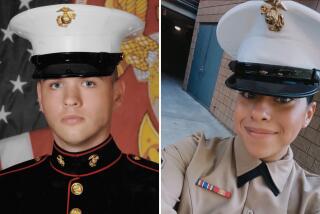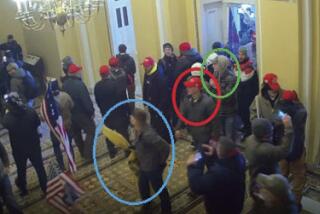Robertson Did Avoid Combat, Friend Concurs
- Share via
WASHINGTON — Ex-Marine John Gearhart of Los Angeles, a key figure in the controversy over Pat Robertson’s military service record, Wednesday supported allegations that the television evangelist used political influence to avoid combat duty in Korea.
Robertson, who is soliciting support for a race for the Republican presidential nomination, has claimed that he is a combat veteran of the Korean War. But Gearhart backed up most of the allegations made by another ex-Marine, former Rep. Paul N. (Pete) McCloskey Jr. (R-Menlo Park), that Robertson did not see combat and sought intervention from his father, the late Sen. A. Willis Robertson (D-Va.), to avoid front line duty.
For the record:
12:00 a.m. Sept. 26, 1986 For the Record
Los Angeles Times Friday September 26, 1986 Home Edition Part 1 Page 2 Column 1 National Desk 1 inches; 34 words Type of Material: Correction
In an article about the controversy over Pat Robertson’s military service that appeared in Thursday’s editions of The Times, ex-Marine Edwin Gaines, a history professor at the University of Arizona, was erroneously referred to as Edwin Davis.
In a letter that was addressed to Rep. Andrew Jacobs Jr. (D-Ind.), and distributed to a number of Washington journalists, McCloskey said that Robertson, Gearhart and two other Marine lieutenants were pulled off a Korea-bound ship and assigned to a base in Japan after Robertson talked frankly of telephoning his father from Japan to seek his intervention.
In a telephone interview, Gearhart, now a manufacturer’s representative, said he was with Robertson, whom he considered “a very good friend,” in 1951 when Robertson called his father from Japan and that “it was generally understood we were pulled off because of the good fortune of Pat’s influence.”
“More than anything else, it disappoints me that Pat denies ever making any phone calls,” Gearhart said. “I wish he would just state that, sure, he made the phone call and let it go at that.”
Robertson has emphatically denied he ever asked his father to intervene. But his aides say he will have no further comment on the matter until he has had a chance to compile statements from other people to rebut the allegations and substantiate his own account of his military service.
Denial by Spokesman
Benton Miller, a spokesman for Robertson’s Christian Broadcasting Network, said Robertson “never called his dad and never asked his dad to intervene in any shape or form. He went where the Marine Corps ordered him to go.” After Robertson’s later transfer to Korea, Miller said, “he was in a combat zone and was subject to shelling just like anyone else. He was awarded three battle stars. His record shows that.”
Gearhart says he recalls walking with Robertson from their ship, the Breckinridge, into Kobe, Japan, “and into a U.S. Special Services facility where they had telephones with radio connections available for servicemen. And we each made separate calls to our parents.”
When they walked back to the ship, Gearhart said, he still fully expected to be shipped to Korea the next day, but that morning orders came assigning him, Robertson and four other lieutenants, including Edwin Davis, a Robertson friend from Lexington, Va., to duties in Japan.
Davis, now a history professor at the University of Arizona, says that “we might have received preferential treatment, but I never heard Pat ask for it.”
Roomed With Robertson
Reached by telephone in Lexington, where he is on a sabbatical, Davis said he and Robertson roomed together in prep school and remained good friends. In the Marines, he said, Robertson “wasn’t hesitant about letting people know his father was a senator.”
Another ex-Marine, Pierce Power, a Huntington, N.Y., attorney, said that, when he was with Gearhart in Korea in 1951, Gearhart told him the same story about Robertson’s avoiding combat duty that McCloskey related in his letter. “We used to talk about it all the time,” he said.
“I met Robertson later in 1952 at Quantico,” Power said. “He was a helluva nice guy, but certainly no evangelist at that time, just a typical young Marine.”
Power says he and Gearhart, both of whom were wounded in Korea, have kept in contact with each other and that Gearhart telephoned him on Sept. 13, the 34th anniversary of the day they were both wounded, to discuss a newspaper column concerning McCloskey’s letter.
‘No Ax to Grind’
“Gearhart has no ax to grind,” Power said. “He considers Pat Robertson a friend.”
Although Robertson’s autobiography and material distributed by the Christian Broadcasting Network refer to him as a combat veteran, McCloskey, Gearhart and other ex-Marines said the evangelist never saw front-line duty after his transfer to Korea.
“Pat was a brilliant man and probably had something to do with intelligence work,” Gearhart said. “But I’m sure he was not in combat. We came back on the same ship. He was in division headquarters. He may have been within range of artillery fire, but was nowhere near the front lines.”
McCloskey, in his letter, said Gearhart had resented being stationed in Japan and had approached the commandant of the Marine Corps at a cocktail party and asked that he and other lieutenants who had not served in Korea be transferred to Korea. The next day, McCloskey said, Gearhart, Robertson and several other lieutenants were sent to Korea.
‘Not the Commandant’
“That’s basically true,” Gearhart said, “but it was not the Marine commandant, it was Gen. Lemuel Shepherd, who was in charge of all the Marines in the Pacific, including all those in Korea. He was known to Pat Robertson and Ed Gaines because of family associations and he had been to VMI (Virginia Military Institute) and was from Virginia. And Robertson was not sent to Korea for about a month, but Gaines and I were sent the next day.”
Gaines, whose father, Francis Pendleton Gaines, president of Washington and Lee University, was a friend of Gen. Shepherd, said he was at the cocktail party with Gearhart.
“I remember John Gearhart pointing out that four of us at the cocktail party never had been in combat and he and I were the first ones to go after that. I went over and got shot up. Pat went later but he never became a platoon leader.”
More to Read
Get the L.A. Times Politics newsletter
Deeply reported insights into legislation, politics and policy from Sacramento, Washington and beyond. In your inbox twice per week.
You may occasionally receive promotional content from the Los Angeles Times.










